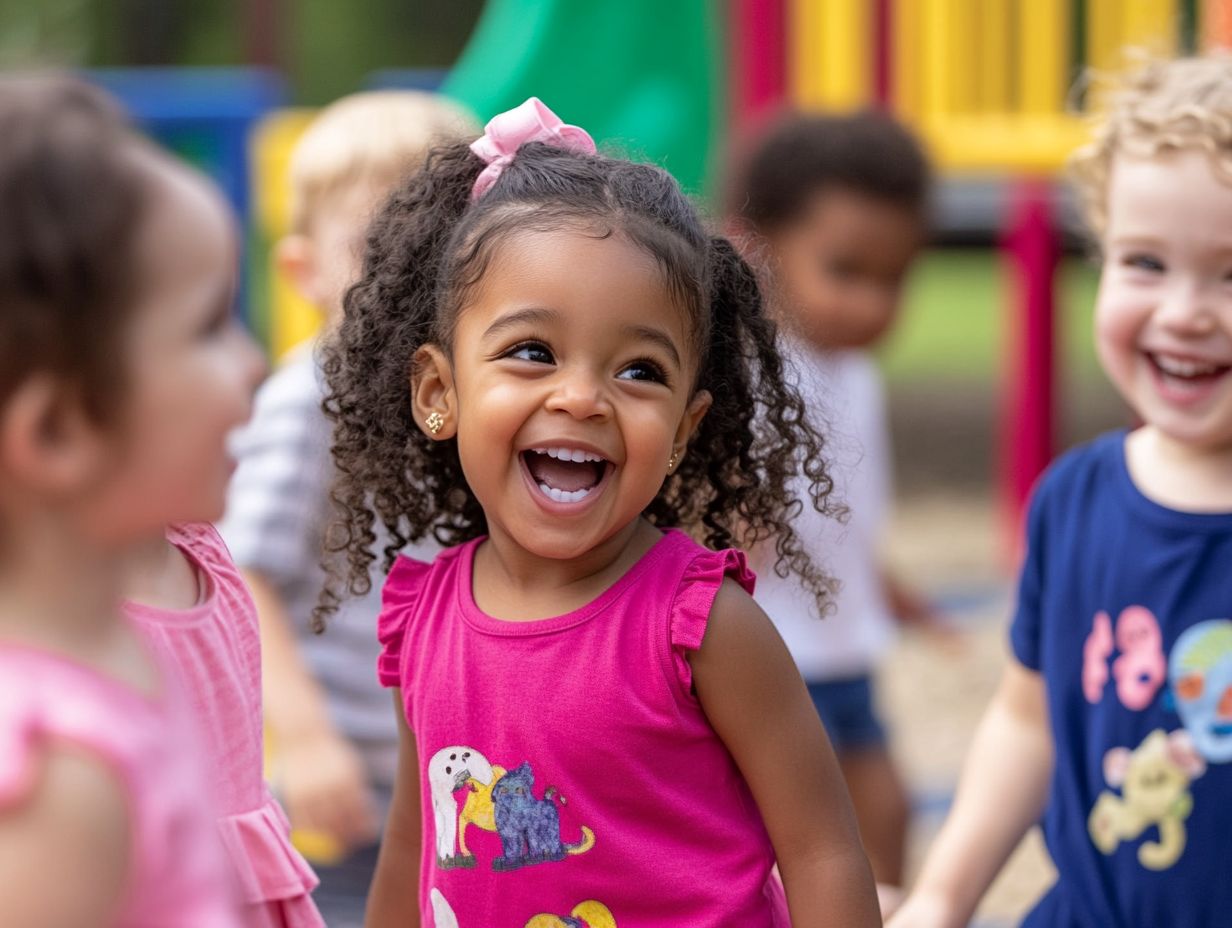Understanding Emotional Development Milestones
Emotional development plays a pivotal role in a child’s growth, influencing their capacity to recognize, express, and manage feelings throughout their lives while also impacting their social skills and overall child development.
This exploration delves into the various stages of emotional development, spanning from infancy to adolescence. It highlights the key developmental milestones that indicate healthy emotional growth.
You will uncover practical strategies for parents and caregivers to support this vital journey, ensuring that children establish robust emotional foundations for their future and enhance their skills for understanding and managing feelings.
Grasping how nurturing emotional intelligence can empower young minds is absolutely essential.
Contents
- Key Takeaways:
- What Is Emotional Development?
- Why Are Emotional Development Milestones Important?
- What Are the Stages of Emotional Development?
- 1. Infancy (0-12 Months)
- 2. Toddlerhood (1-3 Years)
- 3. Early Childhood (3-6 Years)
- Emotional Development in Children
- What Are Some Common Emotional Development Milestones?
- Building Relationships
- How Can Parents and Caregivers Support Emotional Development?
- Creating a Safe and Nurturing Environment
- Encouraging Emotional Expression
- Frequently Asked Questions
- Understanding Emotional Development Milestones in Children
- Why is it important to understand emotional development milestones?
- What are some examples of emotional development milestones?
- How do emotional development milestones differ from physical milestones?
- What factors can influence a child’s emotional development milestones?
- What should I do if I have concerns about my child’s emotional development milestones?
- Conclusion
Key Takeaways:

- Understanding emotional development is essential for parents and caregivers to support their child’s growth, providing them with crucial parenting tips.
- There are different stages of emotional development, and each has its milestones that children should reach, including key emotional milestones tracked through developmental guidelines.
- Parents and caregivers can support emotional development by creating a safe environment, encouraging expression, teaching self-control, and modeling healthy relationships. The Centers for Disease Control and Prevention provides valuable resources on this topic.
What Is Emotional Development?
Emotional development is the journey you embark on with children as they learn to recognize, express, and manage their emotions. It also includes understanding and cultivating healthy relationships with others, critical components of child development.
This process is essential for nurturing their skills for understanding and managing feelings, which play a pivotal role in many facets of their growth, especially when it comes to navigating emotional challenges and enhancing their emotional intelligence, as highlighted by experts like Dr. Fran Walfish and Melissa Hart.
By providing a solid foundation in emotional regulation and expression, you can greatly influence a child’s mental health and overall development from infancy through adolescence, as supported by research from Laura E. Berk and Rasmussen University.
Why Are Emotional Development Milestones Important?
Emotional development milestones serve as essential markers that reveal your child’s progress in comprehending and managing emotions. They significantly impact their capacity to build positive relationships and navigate social environments, which are crucial aspects of childhood education.
These milestones differ across various developmental stages and provide invaluable guidance for caregivers and educators in nurturing emotional growth. They allow for tailored support that aligns with your child’s unique journey, as emphasized by child psychology experts like Adina Mahalli and Kate Tunstall.
By recognizing these emotional milestones, you empower yourself to monitor progress effectively and intervene when necessary. This ensures that your child develops the crucial skills for emotional regulation and healthy social interactions through effective child evaluation and positive reinforcement.
What Are the Stages of Emotional Development?
Emotional development unfolds in distinct stages, each marked by specific emotional skills and challenges that children navigate as they mature. From the initial days of infancy, where emotional expression is largely non-verbal, to the intricate emotional landscapes of adolescence, grasping these developmental stages is crucial for caregivers and educators alike, as highlighted by the National Center for Safe and Supportive Learning Environments.
Each phase toddlerhood, early childhood, and middle childhood offers unique opportunities to nurture emotional growth, foster social development, and equip children with essential tools for emotional regulation and empathy, as explored in various child development studies.
Understanding this journey allows you to support children in becoming emotionally intelligent individuals, ready to face the complexities of life and develop strong self-awareness skills.
By understanding this journey, you can empower children to thrive emotionally!
We encourage parents and caregivers to actively engage with the strategies suggested throughout this article and to take actionable steps in supporting the emotional development of their children.
1. Infancy (0-12 Months)
During the infancy stage, from birth to 12 months, your emotional development is primarily shaped by the influence of your caregivers. You express basic emotions like joy, anger, and fear, which are critical aspects of infant development.
The profound bond you form with your caregivers during this critical period significantly shapes your emotional landscape. Their responses to your emotional expressions can either facilitate or hinder the development of secure attachment, a cornerstone of attachment theory and crucial for understanding emotional development.
Caregivers who show warmth and sensitivity help children learn to trust and feel safe, paving the way for positive emotional growth.
As you engage in social referencing, which means looking to caregivers for cues on how to react to situations, you begin to observe and interpret your caregivers emotional reactions. This helps you understand your emotions better.
This dynamic interaction not only enhances your ability to articulate your own emotions but also equips you with essential tools for emotional regulation and resilience as you move into the more complex emotional phases of early childhood.
Key Takeaway: The emotional connections formed during infancy lay the foundation for future emotional well-being.
2. Toddlerhood (1-3 Years)
In toddlerhood, you will witness remarkable emotional growth in children aged 1 to 3 years. They begin to master emotional regulation and develop a basic emotional vocabulary. This stage is characterized by the emergence of more complex emotions and behaviors, including temper tantrums and the onset of self-soothing strategies.
As a caregiver, your role is crucial in guiding toddlers through these emotional challenges. You help them understand and express their feelings while promoting positive emotional milestones through caregiver support and relationship building.
During this period, toddlers often grapple with intense emotions that they may struggle to articulate. This can lead to moments of frustration and distress, which are common emotional challenges faced during toddlerhood.
They may find sharing, transitioning, or adhering to limitations particularly challenging, resulting in crying or anger outbursts.
You can support these little ones by modeling calm responses and establishing consistent routines that provide a sense of security. Encouraging them to explore self-soothing techniques such as deep breathing, hugging a favorite toy, or using calming phrases can significantly enhance their ability to cope with overwhelming feelings.
Your patience is key to helping children thrive during this exciting stage of growth!
Key Takeaway: Consistent routines and emotional guidance are essential for toddlers as they navigate their feelings.
3. Early Childhood (3-6 Years)

During early childhood, from ages 3 to 6, children are filled with an insatiable curiosity to explore their emotions and build social relationships. This significantly enhances their emotional communication skills and empathy development.
This stage is marked by the blossoming of empathy, as children begin to grasp the emotions of others and respond in meaningful ways.
Preschool settings offer invaluable opportunities for interactive play and relationship building, allowing them to hone their emotional skills within a nurturing environment, following key preschool milestones.
As they navigate this pivotal period, children become increasingly aware of how their actions affect those around them. This enables them to establish deeper connections with their peers and understand emotions more profoundly.
During these formative years, they acquire essential social skills such as taking turns, sharing, and engaging in cooperative play skills crucial for fostering healthy relationship dynamics.
Preschool programs, through structured activities and guided interactions, play a vital role in nurturing these foundational abilities, as highlighted by experts in early childhood education like Hannah Meinke.
Educators frequently encourage conversations about feelings and present scenarios that allow children to practice empathy. This ensures they not only understand their own emotions but also those of their classmates.
This rich interaction lays the groundwork for emotional intelligence, teaching children how to articulate their feelings effectively and respond sensitively to the emotions of others.
Key Takeaway: Early childhood is a crucial time for developing empathy and emotional intelligence through relational experiences.
Emotional Development in Children
4. Middle Childhood (6-11 Years)
Middle childhood, spanning the ages of 6 to 11, is a pivotal period for enhancing your emotional self-regulation which means managing your feelings and developing problem-solving skills in social contexts. As you interact more with peers, you learn to handle difficult feelings and build positive relationships, with caregivers providing essential emotional guidance along the way.
This stage offers you the chance to refine your coping strategies, engage in independent play, and better understand the emotional challenges that arise.
During this transformative phase, you will increasingly assert your independence, often seeking validation and support from friends rather than relying solely on adults. The friendships you cultivate become vital for your emotional development, introducing you to the intricacies of empathy, cooperation, and conflict resolution.
As you learn to manage your reactions and express yourself clearly, self-regulation emerges as a key factor influencing your ability to work through interpersonal issues and adapt to changing situations.
Focusing on peer relationships fosters a sense of belonging and equips you with essential life skills that significantly enhance your social competence and emotional well-being, as discussed in various studies on child psychology.
5. Adolescence (11-18 Years)
Adolescence, spanning ages 11 to 18, is a tumultuous yet transformative stage in your emotional development, where you navigate the complexities of identity, emotional regulation, and the quest for autonomy. During this time, you may encounter emotional challenges that necessitate learning robust emotional expression and effective coping strategies. Caregivers play a crucial role in this journey, providing support while allowing you the independence needed to learn how to express your emotions effectively and manage your relationships.
This period is marked by intense self-exploration, where feelings of uncertainty and vulnerability can arise as you seek to define who you are in a world that often feels overwhelming. Developing autonomy becomes a central focus, which can lead to conflicts with caregivers who struggle to balance their instinct to protect you with the necessity of granting you freedom.
By engaging in open dialogues, caregivers can significantly influence how you understand and express your emotions. These dynamics not only shape your relationships with family and peers but also lay the groundwork for your future emotional health, guiding you toward becoming a resilient adult capable of navigating life s challenges with confidence.
What Are Some Common Emotional Development Milestones?
- Recognizing and expressing emotions
- Developing empathy
- Understanding and managing feelings
Such milestones act as essential benchmarks for evaluating a child’s emotional growth, offering valuable insight into their social-emotional skills. As a caregiver or educator, tracking these emotional milestones is vital to ensure that children receive the necessary support to foster emotional regulation and nurture healthy interpersonal relationships.
Think about how these stages apply to the children in your life!
1. Recognizing and Expressing Emotions
The ability to recognize and express emotions serves as a critical emotional milestone, beginning in early childhood and evolving into a more intricate skill set as you grow. This capability encompasses understanding emotional vocabulary, which enables you to accurately label your feelings and communicate them with clarity.
By honing these competencies, you enhance your emotional expression. This sets the stage for healthier interactions and positive relationships.
As you navigate through life, you’ll find that your understanding of emotions transitions from a simplistic view often limited to joy or anger to a more nuanced awareness that includes a broad spectrum of feelings such as frustration, empathy, and anxiety. A rich emotional vocabulary empowers you to articulate your experiences with precision. This fosters not just self-awareness skills but also deeper connections with those around you.
Engaging in conversations about emotions supports your growth and provides a safe space to explore your feelings. When you have an expansive emotional lexicon, you are better prepared to handle conflicts, express your needs, and build resilience. Ultimately, this shapes your social skills and emotional intelligence as you mature, enriching your journey through life.
2. Developing Empathy
Developing empathy is a crucial emotional milestone. It enables you to understand and relate to the feelings of others, fostering healthy social relationships. This skill starts to blossom during early childhood and becomes increasingly pronounced in middle childhood.
As you learn to recognize and respond to the emotions of your peers, you enhance your emotional intelligence. This contributes to positive interactions and effective conflict resolution.
As you progress through various developmental stages, your capacity for empathetic responses evolves. You engage more profoundly with the feelings and perspectives of those around you. Initially, you may demonstrate basic emotional understanding, such as identifying when someone is upset or happy.
As you mature, you begin to grasp the reasons behind those emotions. This equips you to offer genuine support or comfort to your peers. Caregivers play a vital role in this journey. They employ strategies like modeling empathetic behavior, encouraging discussions that promote perspective-taking, and creating opportunities for cooperative play.
By fostering these skills, caregivers significantly influence your ability to form meaningful connections throughout your life.
3. Understanding and Managing Emotions

Understanding and managing emotions is a crucial milestone. It empowers you to navigate your emotional landscape with confidence. As you grow, you acquire various coping strategies to tackle emotional challenges. This promotes emotional regulation and resilience.
Mastering this skill is vital for building self-awareness and nurturing positive relationships. It equips you with the tools needed to handle your feelings and respond to others appropriately. The importance of mastering these emotional skills cannot be overstated.
By developing a nuanced understanding of your emotions, you become better equipped to recognize and empathize with the feelings of your peers. This empathy fosters stronger friendships and enhances your collaborative problem-solving abilities, which are key elements of effective teamwork.
As you learn to regulate your emotions during conflicts or stressful situations, you build confidence and reduce anxiety. This contributes to a more balanced emotional state. In turn, emotional intelligence cultivates a more resilient you, ready to face the complexities of adult life with grace and strength.
Building Relationships
Building relationships is a significant milestone in your social journey. Your emotional skills guide you in forming healthy connections.
Caregivers model effective relationship-building by supporting your development of empathy, communication skills, and conflict resolution skills.
Through positive interactions with your caregivers, you observe how to express your feelings appropriately while recognizing the emotions of others. This lays a solid foundation for future connections.
You learn the vital importance of listening, sharing, and compromising key ingredients for cultivating friendships. Engaging in guided play or group activities allows you to practice these skills in real-time, honing your ability to manage disputes and appreciate collaboration.
This foundational learning enhances your social competence and promotes your psychological well-being. It equips you to navigate the complexities of human interactions with greater ease. Utilizing self-soothing strategies and participating in independent play can further strengthen these skills.
How Can Parents and Caregivers Support Emotional Development?
Parents and caregivers play a crucial role in nurturing emotional development. They create an environment that encourages emotional expression and cultivates emotional regulation.
By providing positive reinforcement and thoughtful guidance, you can assist children in developing essential social-emotional skills. This helps them navigate their emotional landscape effectively.
Fostering open communication and demonstrating understanding empower children to articulate their feelings. You provide them with tools necessary to manage their emotions and foster healthy relationships.
Creating a Safe and Nurturing Environment
Creating a safe environment is vital for your child’s emotional growth! It equips them with the emotional security needed to explore their feelings freely.
Establish consistent routines, offer reassurance, and actively listen to children’s emotions. A nurturing atmosphere encourages them to express themselves openly, helping them cultivate a strong sense of self-awareness and emotional growth.
Your unconditional love and support enhance a child s confidence and instill a sense of belonging, making them feel valued and understood.
This foundation is critical for enabling children to navigate their emotions healthily. Recognizing developmental variations is also key to providing appropriate support tailored to each child’s unique needs.
To promote such an environment, consider engaging in:
- Regular family discussions
- Creating a safe space for sharing thoughts without judgment
- Modeling positive emotional expressions yourself
Simple practices like routine check-ins about their day or encouraging playful moments can significantly strengthen emotional bonds, ensuring that children feel secure and nurtured.
Encouraging Emotional Expression
Helping children express their feelings is essential for their emotional development. It empowers them to articulate their feelings and effectively navigate emotional challenges.
Introduce emotional vocabulary and validate your child’s emotions. This creates a safe and welcoming space for them to share their thoughts and feelings.
This practice enhances their emotional awareness and strengthens the bond between you and your child, promoting healthy emotional growth.
Incorporating techniques like active listening demonstrates genuine interest in your child s feelings, showing them that their emotions truly matter.
Introduce emotional vocabulary through storytelling or engaging conversations about characters feelings. This helps your child identify and express their emotions more clearly.
Creating an environment free from judgment is equally important. When children feel comfortable discussing their innermost thoughts, it fosters trust and nurtures resilience, enabling them to approach future challenges with confidence.
Ultimately, developing these skills early on lays the foundation for better emotional regulation throughout their lives.
Frequently Asked Questions
3. Teaching Emotional Regulation
Teaching emotional regulation is an essential part of nurturing children s emotional development. It equips them with the tools needed to manage their feelings and reactions in various situations. You can introduce coping strategies and ways to calm themselves down that help children navigate emotional hurdles, fostering resilience and emotional well-being.
By cultivating these skills, you empower children to develop a robust emotional toolkit they can draw from throughout their lives. This foundational training includes many forms, such as practicing mindfulness, engaging in deep-breathing exercises, or encouraging creative expression through art or journaling.
These approaches help children recognize their emotions and teach them how to respond constructively, minimizing the chances of negative behaviors during stressful times. When children learn emotional regulation early on, they set the stage for healthier relationships, enhanced academic performance, and reduced anxiety and depression in the future.
As these children transition into adulthood, their ability to cope with life s challenges will undoubtedly be a valuable asset, contributing significantly to their overall emotional resilience.
4. Modeling Healthy Relationships

Modeling healthy relationships is essential for you as a caregiver since children learn by observing the interactions and emotional responses of those around them. By demonstrating positive relationship dynamics, you provide crucial emotional guidance that shapes children s understanding of relationships and their ability to express emotions.
This practice nurtures empathy and communication skills and plays a vital role in developing healthy social relationships as children mature. For example, engage in open discussions about feelings, encouraging children to articulate their emotions while validating their experiences.
By resolving conflicts constructively like peacefully negotiating differences in opinion you exemplify effective communication and compromise. Showing affection, whether through encouraging words or gentle physical touch, reinforces the notion that love and connection are fundamental in relationships.
Incorporating shared activities helps strengthen bonds as you and the children discover mutual interests, further enriching their emotional framework. Through these interactions, you equip children with invaluable tools to navigate their future relationships with confidence and success.
5. Seeking Professional Help if Needed
Recognizing when to seek professional help is pivotal in nurturing children s emotional development, especially when they encounter significant emotional challenges that could affect their mental health. Pay close attention to signs that suggest a child might benefit from guidance, such as ongoing emotional distress or struggles with social interactions.
By accessing the right resources and support, you empower children to cultivate resilience and coping strategies, ultimately enhancing their emotional well-being. Knowing when to get professional help can be tough for many parents and guardians.
You may find yourself pondering when it s most appropriate to consult a therapist, counselor, or child psychologist. Effective communication with your child is essential; encourage them to express their feelings and stresses, creating a safe space for open discussion.
Professional support provides valuable insights that can help you identify underlying issues, equipping you with strategies for both the child and yourself. Resources like local support groups, mental health hotlines, and school counselors can be invaluable in helping you find the right professional fit.
Engaging with specialists not only addresses current challenges but also equips children with the tools they need to navigate future emotional hurdles, fostering their ability to adapt and thrive.
Understanding Emotional Development Milestones in Children
Emotional development milestones are specific skills and behaviors that children typically exhibit at certain stages of their emotional development. These milestones are important markers of a child’s emotional growth. They can help parents and caregivers understand and support their child’s emotional development.
Why is it important to understand emotional development milestones?
Knowing emotional development milestones helps parents spot any issues in their child’s emotional growth. This knowledge allows them to provide the right help for healthy emotional development.
What are some examples of emotional development milestones?
Examples of emotional development milestones include:
- A baby’s ability to respond to and imitate facial expressions.
- A toddler’s display of empathy towards others.
- A preschooler’s understanding and expression of complex emotions such as shame or guilt.
How do emotional development milestones differ from physical milestones?
While physical milestones are more visible and easily measured, emotional development milestones are more subtle and complex. They involve a child’s ability to understand, manage, and express emotions, which can vary greatly from child to child.
What factors can influence a child’s emotional development milestones?
Several factors can influence a child’s emotional development milestones, including:
- Genetics
- Temperament
- Family dynamics
- External influences such as culture and environment
Parents and caregivers should remember that every child develops at their own pace.
What should I do if I have concerns about my child’s emotional development milestones?
Don t hesitate to reach out to a healthcare professional if you re concerned about your child s emotional milestones. They re there to help!
Conclusion
Understanding emotional development milestones is crucial for supporting your child’s emotional growth. Stay informed and engaged with your child’s development to ensure they receive the guidance they need.
For more insights and updates on child emotional growth, consider subscribing to our newsletter or exploring additional articles on child development.






